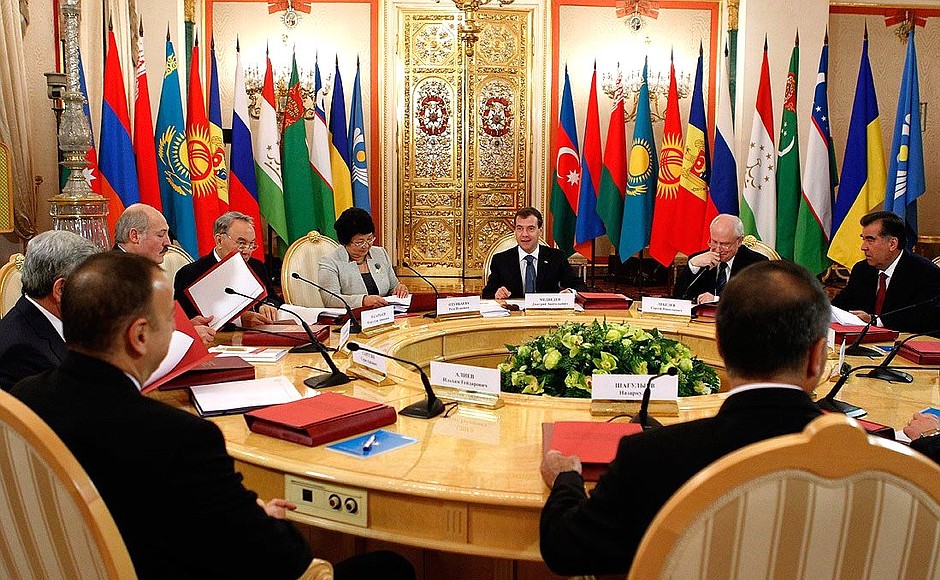
President of Russia Dmitry Medvedev: Heads of state, colleagues,
As you know, Russia is the largest nation on the planet in terms of territory. Therefore, when we host summits, they are also the longest. For some of you here, this is already the third summit in a short period of time. But I hope that ultimately, this will have an impact on what we do.
As usual, we have just had an engaged, occasionally emotional discussion in a restricted format on the current problems in further strengthening our Commonwealth; we also talked about what was happening nearly 20 years ago. We certainly consider increasing the CIS’ efficacy to be our utmost priority. And now, we will briefly discuss priorities in our joint work, focusing on the outcomes of Russia’s presidency of the Commonwealth.
I won’t hide that one of the most important events for all of us this year was the 65th anniversary of the Great Victory. It was widely celebrated in all CIS nations, which once again showed that all of our people remember what happened 65 years ago and honour the heroism of our fathers, who defended what was then our common Fatherland and saved the world from Nazism.
Over the course of this year, we have given attention to broadening conditions for partnership, and it has become possible to form a full-fledged CIS free trade zone – which, incidentally, meets the requirements of the WTO. We expect that a draft agreement on forming such a zone will be finalised at the end of December, during a meeting of the working group. Today, my colleagues will say more on this topic.
2010 is the Year of Science and Innovation in the Commonwealth of Independent States, and we talked about high technologies. This topic is exceedingly important to Russia, and I am certain that it is important for all the other states present here. We are creating the Council on Cooperation in Fundamental Sciences and developing a long-term programme for innovative cooperation between CIS member states through 2020. I am certain that the joint projects in this sector will help improve the competitiveness of the economies that make up the CIS.
We have strived to engage young people. We had our young citizens meet one another; in Russia, this happened at various forums. At the end of October, projects were presented at the 1st CIS Science Festival in Moscow. Overall, in this regard, everything went well and we have launched a good initiative. In addition, the first group of students enrolled to joint Master’s programmes through the CIS open network university. It included 18 universities from all nine CIS nations. And we awarded the corresponding prizes.
Humanitarian cooperation has also been developing. We passed a new two-year humanitarian cooperation plan. And I suppose that this is very important, because we are always thinking about what ties us together and complaining that the level of integration is not quite what we had been counting on two decades ago, when the CIS was just created. But at the same time, the humanitarian sector and the cultural and humanitarian ties that we were able to maintain within CIS territory are certainly among our most valuable achievements.
The presidency of the Commonwealth will be taken over by Tajikistan. I expect that together, we will gradually implement the plans we have laid out, including those reflected in the framework of Russia’s CIS presidency. I am referring to trade issues, energy, and transport.
And the last thing I would like to say is that this upcoming year – as we have just discussed – will mark the 20th anniversary of the CIS. We agreed that we will have the corresponding discussions and readings, and will talk about what we were and were not able to achieve. Different views will be expressed; that is normal. All of this will occur as scheduled. In addition, we have agreed to hold informal debriefing, an informal CIS summit at the end of next year in Moscow.
I suggest that we begin our work and proceed with our agenda.